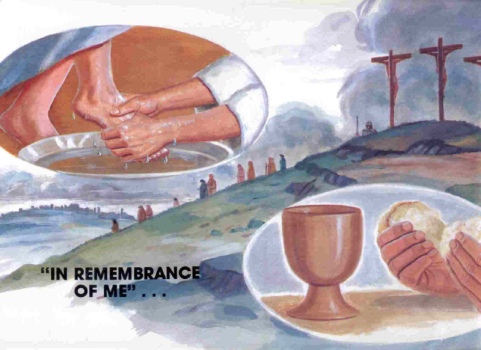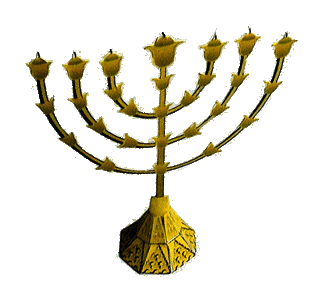The book about the life of Jesus Christ,
the Son of God
“Verse by verse”, the deeper meaning of this Bible book, explained in the light of the Israelitic tabernacle

The breakthrough of and into the divine life
(Part II)
The sharing of Jesus’ breakthrough with the Church.
John 21 verse 1-14: “After these things Jesus shewed himself again to the disciples at the sea of Tiberias; and on this wise shewed he himself. There were together Simon Peter, and Thomas (also) called Didymus, and Nathanael of Cana in Galilee, and the sons of Zebedee (namely James and John), and two other of his disciples. Simon Peter saith unto them, I go a fishing. They say unto him, We also go with thee. They went forth, and entered into a ship immediately; and that night they caught nothing. But when the morning was now come, Jesus stood on the shore: but the disciples knew not that it was Jesus. Then Jesus saith unto them, Children, have ye any meat (namely fish, to eat)? They answered him, No. And he said unto them, Cast the net on the right side of the ship, and ye shall find (fish). They cast (out the net) therefore, and now they were not able to draw it for the multitude of fishes. Therefore that disciple whom Jesus loved (namely John) saith unto Peter, It is the Lord. Now when Simon Peter heard that it was the Lord, he girt his fisher’s coat unto him, (for he was naked,) and did cast himself into the sea. And the other disciples came in a little ship; (for they were not far from land, but as it were two hundred cubits [1]); dragging the net with fishes. As soon then as they were come to land, they saw a fire of coals there, and fish laid thereon, and bread. Jesus saith unto them, Bring of the fish which ye have now caught. Simon Peter went up, and drew the net to land full of great fishes, an hundred and fifty and three: and for all there were so many (fish), yet was not the net broken. Jesus saith unto them, Come and dine. And none of the disciples durst ask him, Who art thou? knowing that it was the Lord. Jesus then cometh, and taketh bread, and giveth them, and fish likewise. This is now the third time that Jesus shewed himself to his disciples, after that he was risen from the dead.”
Seven of Jesus’ disciples were at the Sea (actually the lake) of Tiberias. Other names of this lake were “Lake of Kinneret” and “Sea of Galilee”. They were: Simon Peter, Thomas, Nathanael; the brothers James and John and two, not mentioned by name. At Peter’s suggestion they went fishing in the lake. However, it ended in failure, all night they did not catch anything…
In the morning Jesus appeared on the lake’s shore without revealing Himself to them at first. He asked the fishers for meat (for bread), for fish, but they had nothing for Him. Jesus asked His disciples for meat, for fish, which His disciples had and have to catch… He Himself was and is the Bread of Life (John 6:48), while His earthly servants form the meat, the fish, at the divine meal for those, who have repented unto Him (because His servants pass on the spiritual food, namely the spoken Word of the cross).
But without Jesus, without His co-operation, all spiritual labor is in vain, and at best “wood, hay and straw”, which cannot endure the test of the “Fire”, thus the (divine) trial (John 15:5; 1 Corinthians 3:12). His first disciples had to learn this too. This is why they did not catch anything that entire night; but at the direction (thus under guidance) of Jesus they again cast the net, now to the right side of the ship. Then they caught a large amount of fish; so much, that they (all) could not drag it on board. On land they saw Jesus at a coal-fire, with bread and fish over it. Jesus then asked them to pull the caught fish on land to roast some of it over the fire. They had caught 153 large fish.
The ciphers of the number 153 together form the number 9, which speaks of the nine gifts of the Holy Spirit, which must be in His service unto the establishment (the growth) of the Church (1 Corinthians 12:8-10).
This catch (of fish) is prophetic and symbolizes all the future work of His disciples throughout the ages, namely the sharing of Jesus’ breakthrough of redemption and life with the (human) world, initially lost in sin.
The granting of grace and the calling of Peter.
John 21 verse 15-25: “So when they had dined, Jesus saith to Simon Peter, Simon, son of Jonas, lovest thou me more than these? He saith unto him, Yea, Lord; thou knowest that I love thee. He saith unto him, Feed my lambs. He saith to him again the second time, Simon, son of Jonas, lovest thou me? He saith unto him, Yea, Lord; thou knowest that I love thee. He saith unto him, Feed my sheep. He saith unto him the third time, Simon, son of Jonas, lovest thou me? Peter was grieved because he said unto him the third time, Lovest thou me? And he said unto him, Lord, thou knowest all things; thou knowest that I love thee. Jesus saith unto him, Feed my sheep. Verily, verily I say unto thee, When thou wast young, thou girdedst thyself, and walkedst whither thou wouldest (go thyself): but when thou shalt be old, thou shalt stretch forth thy hands, and another shall gird thee, and carry thee whither thou wouldest not. This spake he, signifying by what death he should glorify God. And when he had spoken this, he saith unto him, Follow me. Then Peter, turning about, seeth the disciple whom Jesus loved (namely John) following; which also leaned on his breast (or: leaned over to Him) at supper, and said, Lord, which is he that betrayeth thee? Peter seeing him saith to Jesus, Lord, and what shall this man do (what shall happen to him)? Jesus saith unto him, If I will that he tarry till I come (again), what is that to thee? follow thou me. Then went this saying abroad among the brethren, that that disciple should not die: yet Jesus said not unto him, He shall not die; but, If I will that he tarry (will live) till I come (back), what is that to thee? This is the disciple which testifieth of these things, and wrote these things: and we know that his testimony is true. And there are also many other things which Jesus did, the which, if they should be written every one, I suppose that even the world itself could not contain (all) the books that should be written. Amen.”
In the night of His capture, Peter had disowned the Lord three times (Matthew 26:69-75; Mark 14:66-72; John 18:17-18 and 25-27); a fact, which has been recorded clearly by all four of the evangelists, and a fact Peter was very ashamed of, especially also before the other disciples.
This is why Jesus now turned to him personally to show him, that He had forgiven him this repudiation, and to point out that the other were not to blame him for this any longer. Therefore Peter had to openly say to Jesus three times, within hearing of the other disciples, “that he loved Him”. Thereupon Jesus said to him three times – after all, he had disowned Him three times – that He also commissioned him to shepherd and feed the Church.
Jesus also said to Peter, that he once, when he would have grown old, because of his labor for Jesus, like Jesus Himself would die a martyr’s death. Here-with he would prove to the world that he no longer feared people and death, which fear initially made him disown Jesus…
Peter then asked the Lord whether John would also suffer this, but the Lord rebuked Peter in this and said to him, that this was something that did not concern him. Yet Jesus told him, that He did not wish John to suffer this, and that he would die a natural death. Which also happened.
The chapters of the Gospel according to John seen in the light of the Israelitic Tabernacle.
Chapter 1 In the light of the Gate
Chapters 2-4 In the light of the Altar of Burnt Offering
Chapter 5 In the light of the Laver and the Door (to the Holy Place)
Chapters 6-7 In the light of the Table of Showbread
Chapter 8 In the light of the Candlestick
Chapter 9 In the light of the Altar of Incense
Chapters 10-11 In the light of the Veil
Chapter 12 In the light of the sevenfold sprinkling of blood before the Ark
Chapters 13-21 In the light of the Ark of the Covenant
By E. van den Worm
A Dutch Bible teacher
The end
PDF of this complete study.
**********************************************************************************
[1] A cubit is an old linear measure, based on the length of the human underarm, about 69 cm per cubit; thus, in total they were only at a distance of some 138 metres from the land.
***********************************************************************************
P.S. :
Translated from Dutch into English
See our Dutch site https://eindtijdbodeBijbelstudies.wordpress.com with far more studies you can translate by Google etc.
***********************************************************************************
.
.


